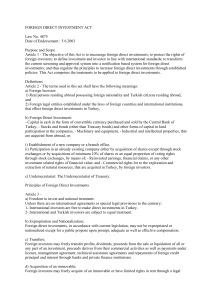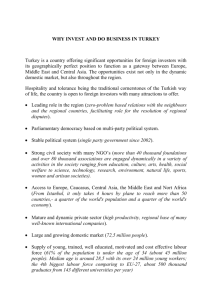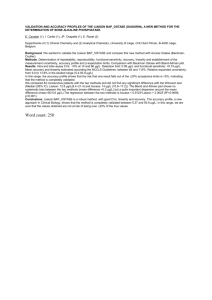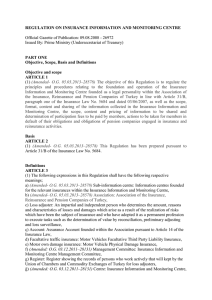4875 Foreign Direct Investment Law
advertisement
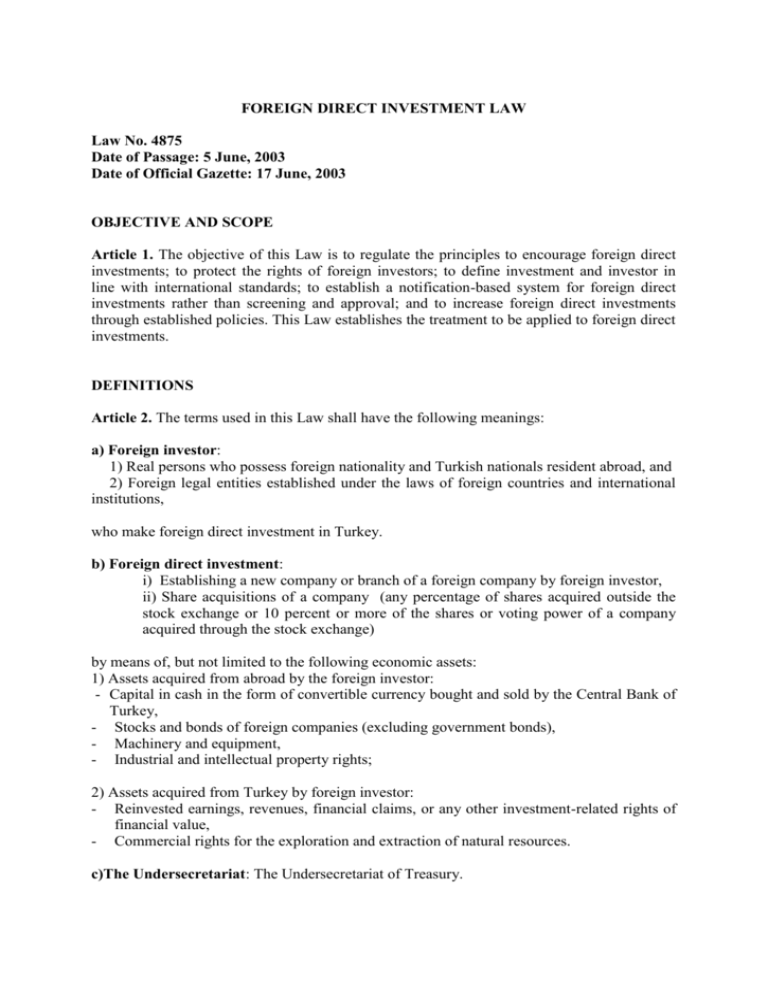
FOREIGN DIRECT INVESTMENT LAW Law No. 4875 Date of Passage: 5 June, 2003 Date of Official Gazette: 17 June, 2003 OBJECTIVE AND SCOPE Article 1. The objective of this Law is to regulate the principles to encourage foreign direct investments; to protect the rights of foreign investors; to define investment and investor in line with international standards; to establish a notification-based system for foreign direct investments rather than screening and approval; and to increase foreign direct investments through established policies. This Law establishes the treatment to be applied to foreign direct investments. DEFINITIONS Article 2. The terms used in this Law shall have the following meanings: a) Foreign investor: 1) Real persons who possess foreign nationality and Turkish nationals resident abroad, and 2) Foreign legal entities established under the laws of foreign countries and international institutions, who make foreign direct investment in Turkey. b) Foreign direct investment: i) Establishing a new company or branch of a foreign company by foreign investor, ii) Share acquisitions of a company (any percentage of shares acquired outside the stock exchange or 10 percent or more of the shares or voting power of a company acquired through the stock exchange) by means of, but not limited to the following economic assets: 1) Assets acquired from abroad by the foreign investor: - Capital in cash in the form of convertible currency bought and sold by the Central Bank of Turkey, - Stocks and bonds of foreign companies (excluding government bonds), - Machinery and equipment, - Industrial and intellectual property rights; 2) Assets acquired from Turkey by foreign investor: - Reinvested earnings, revenues, financial claims, or any other investment-related rights of financial value, - Commercial rights for the exploration and extraction of natural resources. c)The Undersecretariat: The Undersecretariat of Treasury. PRINCIPLES CONCERNING FOREIGN DIRECT INVESTMENTS Article 3. a) Freedom to Invest and National Treatment Unless stipulated by international agreements and other special laws: 1. Foreign investors are free to make foreign direct investments in Turkey, 2. Foreign investors shall be subject to equal treatment with domestic investors. b) Expropriation and Nationalisation Foreign direct investments shall not be expropriated or nationalised, except for a public purpose and upon compensation in accordance with due process of law. c) Transfers Foreign investors can freely transfer abroad: profits, dividends, proceeds from the sale or liquidation of all or any part of an investment, compensation payments, amounts arising from license, management and similar agreements, and reimbursements and interest payments arising from foreign loans through banks or special financial institutions. d) Access to Real Estate Companies may freely acquire real estate or limited rights in rem through a legal entity established or participated by foreign investors in Turkey, provided such acquisitions are permitted for Turkish citizens. e) Dispute Settlement For the settlement of disputes arising from investment agreements subject to private law and investment disputes arising from public service concessions agreements which are concluded with foreign investors, foreign investors can apply either to the authorised local courts, or to national or international arbitration or other means of dispute settlement, provided that the conditions in the related regulations are fulfilled and the parties agree thereon. f) Valuation of Non-Cash Capital Non-cash capital is valued within the regulations of Turkish Commercial Law. In case that stocks and bonds of companies residing abroad are used as foreign capital share of foreign investors, the values determined by the relevant authorities in the home country, or by the experts designated by the courts of the home country, or any other international institutions performing valuations will be accepted. g) Employment of Expatriates Foreign personnel working permits are issued by Ministry of Labour and Social Security for foreign personnel to be employed in the companies, branches and entities established within the scope of this Law. In a Regulation to be prepared jointly by the Undersecretariat of Treasury and the Ministry of Labour and Social Security, according to Article 23 of the Law on Foreign Personnel Working Permits No. 4817 dated 27 February 2003, the companies and entities with foreign capital which shall be in the context of the Regulation, the definition of the key personnel within the scope of the Regulation and other special procedures and principles concerning the work permits of key personnel will be determined. Provisions stipulated in Article 14, paragraph 1, sub-paragraph (b) of Law No. 4817 will not be applicable to personnel to be employed within the context of this Regulation. The conditions under which the provisions stipulated in paragraph 1 of Article 13 of Law No. 4817 are to be applied to key foreign personnel employed will be specified in the Regulation. h) Liaison Offices The Undersecretariat is authorised to permit foreign companies established under the laws of foreign countries to open liaison offices, provided that they do not engage in commercial activities in Turkey. DETERMINATION OF POLICIES AND DATA COLLECTION Article 4. Taking into account the objectives of the development plans and annual programs, general economic status of the country, trends in international investments and the opinions of related public institutions and private sector professional organisations, the Undersecretariat is authorised to determine the general framework of policies concerning foreign direct investments, and for this purpose to participate in the activities of other organisations. The consent of the Undersecretariat shall be taken before any amendment or enactment of a regulation related with foreign direct investments. For the purpose of establishing and developing an information system related to foreign direct investments, the Undersecretariat is authorised to request statistical information on investments from all public institutions and private sector professional organisations. Foreign investors shall submit the statistical information on their investments according to the procedures and principles to be determined by a regulation to be enacted by the Undersecretariat. Such information cannot be used as evidence or for any means other than for statistical purposes. OTHER PROVISIONS Article 5. a) Existing Companies with Foreign Capital All companies with foreign capital established pursuant to Law No. 6224 dated 18 January 1954 shall be subject to this Law, reserving their granted rights. b) Regulations The implementing procedures for this Law will be determined in a regulation to be prepared by the Undersecretariat within one month of the publication of the present Law. c) Repealed Provisions The Law for Encouragement of Foreign Capital No. 6224 dated 18 January 1954 is repealed. The references made to Law No. 6224 and its regulations and amendments are considered as referring to the related provisions of this Law. d) Any alteration concerning the articles of this Law is only regulated by means of amending and appending provisions to the present Law. PROVISIONAL ARTICLE 1. The provisions of the decrees, communiqués and circulars in effect, which are in conformity with this Law, shall remain in force until new regulations to regularise the implementation of this Law take effect. EFFECTIVENESS Article 6. This Law shall come into force on the date of its publication. ENFORCEMENT Article 7. The Council of Ministers is entrusted with the enforcement of this Law. From Ministry of State: Regulation for Implementation of Foreign Direct Investment Law PART I Objective, Scope, Basis and Definitions Objective and Scope Article 1 – The objective of this Regulation is to designate the procedures and principles of the issues that is laid down within Foreign Direct Investment (FDI) Law no. 4875 dated 5 June 2003. Basis Article 2 – This Regulation is prepared as based upon Article 5, Paragraph (b) of FDI Law no. 4875. Definitions Article 3 – With regard to the implementation of this Regulation; “Undersecretariat” means, the Undersecretariat of Treasury, “General Directorate” means, the General Directorate of Foreign Investment, “Law” means, Foreign Direct Investment (FDI) Law no. 4875, dated 5 June 2003. PART II Data Requests Statistical Data to be Provided from Authorities and Institutions Article 4 - The Undersecretariat obtains FDI data through Data Sharing Protocols it will set up primarily with Central Bank of Turkey, Capital Market Board, Ministry of Industry and Commerce, Ministry of Finance, Union of Chambers of Commerce and Commodity Exchanges, Trade Registry Offices and other related public authorities and institutions and occupational organizations deemed as public institutions and NGOs, or through other procedures. Within this framework, the related Trade Registry Offices shall send to the Undersecretariat; a) One copy of the “Company or Branch Office Establishment Declaration Form and Petition” to be filled by the related persons, at the phase of company or branch office establishment within the context of Law, b) One copy of the amendments in articles of association of these companies, subject to registration and announcement, c) One copy of the “Register of Shareholders” or “Register of Attendants” submitted to the Trade Registry Offices by these companies. Data to be Requested from Companies and Branch Offices Article 5 - a) Companies and branch offices subject to the provisions of the Law shall submit to the General Directorate; 1) Information on their capitals and operations, in accordance with the “FDI Operations Data Form” given as Annex I of the Regulation, on annual basis, latest until the end of May every year, 2) Information on the payments made to their equity accounts, in accordance with the “FDI Capital Data Form” given as Annex II of the Regulation, within 1 month following the payment, 3) Information on share transfers made between current domestic or foreign shareholders or to any domestic or foreign investor outside the company, in accordance with the “FDI Share Transfer Data Form” given as Annex III of the Regulation, and latest within 1 month following the realization of the share transfer. b) If domestic companies, which are not subject to the provisions of the Law; becomes subject to the provisions of the Law via, 1) A foreign investor participates to the company, or 2) A foreign investor outside the company participates to the company during the capital increase of the company, they shall submit the information on the share transfers, in accodance with the “FDI Share Transfer Data Form” given as Annex III of the Regulation, to the General Directorate latest within 1 month following the realization of the share transfer. PART III Liaison offices Establishment of Liaison Offices Article 6 – The Undersecretariat is authorized to grant permits and extend such permits to companies established in accordance with laws of foreign countries to open liaison offices in Turkey, provided that they do not carry out commercial activities in Turkey. Applications for establishment and extension shall be finalized within 5 days following the application, provided that the necessary information / documents are complete and proper. Applications of foreign companies to establish liaison offices so as to operate in sectors subject to special legislation, such as money and capital markets, insurance, etc., will be assessed by authorities and institutions authorized by the related special legislation. Application Documents Article 7 – The following documents have to be submitted to the Undersecretariat for establishing a liaison office in Turkey: a) The original copy of “Certificate of Activity” of the parent company approved by the related Turkish Consulate or approved in accordance with the provisions of the Convention on the Abolishing the Requirement of Legalization for Foreign Official Documents Approval Obligation, prepared on the basis of the Hague Conference on International Private Law, b) Operational report or balance sheet and income statement of the mother company, c) The original copy of the certificate of authority issued to the name of the person who is appointed to carry out the operations of the liaison office, d) The original copy of the power of attorney in case that another person will carry out the establishment transactions of the liaison office. Provisions Regarding Liaison Office Operations Article 8 – The following provisions govern the operations of liaison office: a) Liaison offices, having received their establishment permit, shall send a copy of the tax office registration document to the General Directorate latest within 1 month. Liaison offices shall notify the General Directorate of any change of address latest within 1 month. b) Liaison offices shall send the “Data Form for Liaison Office Activities” given as Annex IV of the Directive, to the Undersecretariat every year latest until end of May, so as to inform the Undersecretariat about their activities of previous years. Documents certifying that the previous year’s expenses of the office have been covered by foreign currency transferred from abroad, have to be enclosed as well. c) Liaison offices are granted operation permits of 3 years at most. For extensions, successive extensions of maximum 3 years each may be granted by taking into consideration the activities of previous years and plans and objectives for the future. d) In the case that the liaison office terminates its activities, the “termination and examination of business note” to be received from the related tax office has be submitted to the General Directorate. Liaison offices cannot claim any money transfer except the residue arising due to termination and liquidation. e) The Undersecretariat might cancel the permits of liaison offices ascertained to have violated the legislation and shall notify related authorities thereof. PART IV Miscellaneous Provisions Company Types Article 9 – The companies, which can be established or participated by foreign investors are “companies” designated in the Turkish Commercial Code and “unincorporated partnerships” designated in theTurkish Code of Obligations. Partnerships established through agreements under names such as ordinary partnerships, consortiums, business partnerships, joint ventures that do not conform to the explicit features of the company types designated in the Turkish Commercial Code are deemed unincorporated partnerships for the implementation of this Law. Turkish Citizens Residing Abroad Article 10 – Turkish Citizens certifying that they are residing abroad with the work or residence permits, are regarded as foreign investors with regard to the implementation of the Law. Changes in Data Forms Article 11 – The General Directorate is authorized to make any changes in the data forms annexed to this Regulation. Provisional Article 1 –The General Directorate is authorized to deal with the Investment Permit Certificates issued in accordance with Foreign Investment Encouragement Law No: 6224 and Foreign Investment Framework Decree that was put into effect by Council of Ministers’ Decree No: 95/6990 on 7 June 1995 and the Communique concerning this Decree, until the investments involved are finalized and provided that the acquired rights are uphold. Effectiveness Article 12 – This Regulation will become effective on the date of its publication Enforcement Article 13 – The provisions of this Regulation will be enforced by the Ministry of State to which the Undersecretariat of Treasury is associated.
